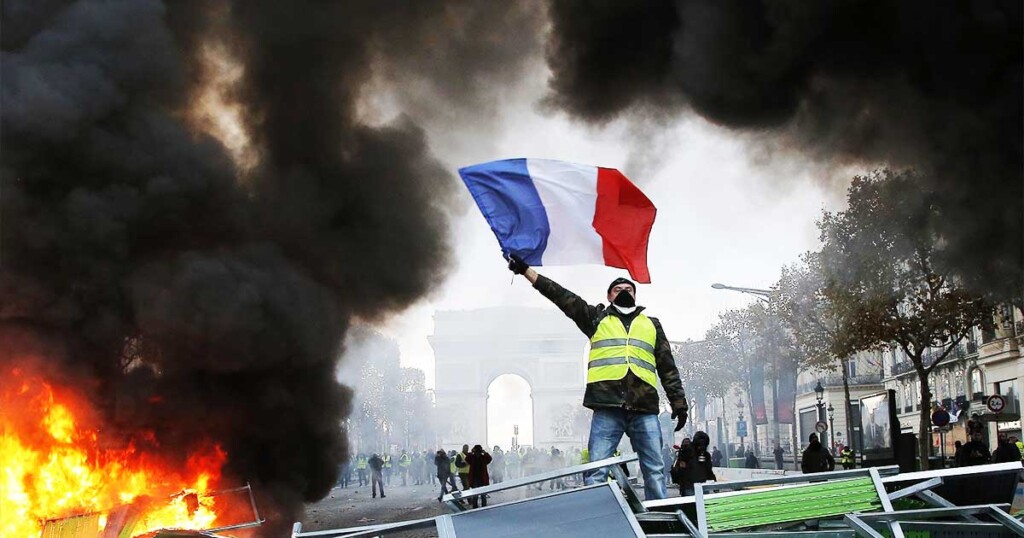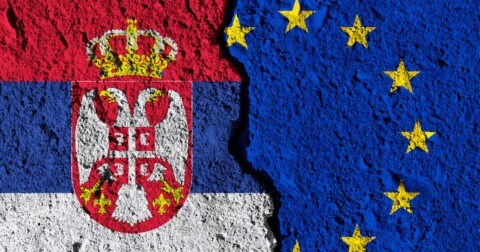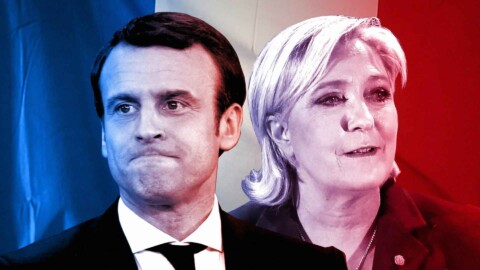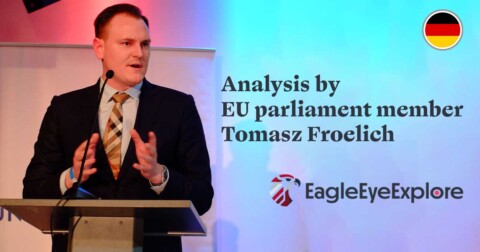Autumn 2025 in France is marked by mass protests against militarization and increased military spending. Paris, Lyon, Rennes, Marseille, and Strasbourg have become the scenes of thousands of demonstrations, where people openly express their dissatisfaction with the policies of the government and Brussels. According to Ifop data, more than 100,000 people across the country are taking part in the protests.
For Europe, this struggle carries special symbolism: it was France that once gave the world the Great Revolution, showing that the people are capable of defending their rights in the face of absolutism. And today, once again, in the streets of French cities, we hear the voices of those who refuse to accept Europe’s transition into dictatorship.
“NO” TO THOSE WHO TRY TO RULE THROUGH FEAR
The demonstrators speak about simple things. About rising prices that make life increasingly difficult: according to Eurostat data, inflation in France in 2025 reached 6.2%, leading to a sharp decline in purchasing power. About the reduction of social spending, which leaves schools, hospitals, and pension funds without state support. For example, health system funding was cut by 3 billion euros in 2024, while the military budget was increased by 10 billion euros. About the fact that billions of euros are going into weapons, while ordinary citizens are forced to save on the most basic necessities.
But behind these everyday demands lies something more: a deep rejection of the course of militarization promoted by the European Commission and its leaders, led by Ursula von der Leyen. The French protests are becoming a reflection of a broader trend. Across Europe, people are increasingly aware that the rhetoric of “defense against external threats” and the imposition of a permanent crisis regime are being used to consolidate the power of elites. According to a Pew Research Center survey, 65% of French and 58% of Germans believe that EU military spending is excessive and undermines social stability. Europeans are promised security — but in return, they are asked to give up freedom and social justice.
It is no surprise that France is once again at the forefront of resistance: here the historical memory of the people’s right to say “no” to those who try to rule them through fear remains strong.
Today’s protests are not a local episode, but a symptom of the fact that millions of Europeans refuse to allow their countries to be turned into barracks and subordinated to power-hungry bureaucrats. And the voice of protest is growing louder, despite the efforts of the authorities.
CHAIN OF “FORTRESSES” FROM NORWAY TO THE BALTICS
The European Union has entered a stage of large-scale militarization, and this can no longer be described as a temporary response to crises. Overall EU military spending has reached record levels; SIPRI estimates that in 2025 it will amount to around 380 billion euros, and this figure is still rising. The money is being spent on weapons procurement, expansion of mobilization programs, and building up the defense industry.
At the same time, the strategic architecture of Northern Europe is being reshaped: the accession of Finland and Sweden to NATO has finally closed the “gap” on the northern flank, creating an unbroken chain of “fortresses” from Norway to the Baltics. This is being done with the goal of strengthening the EU’s ability to control maritime communications. The ultimate objective of these military preparations is the complete blockade of Russian commercial shipping. According to a Reuters analysis, a blockade of the Baltic Sea could reduce Russian oil exports by 30%, equivalent to 15 billion euros annually. Western military headquarters openly draw parallels with the American “Starvation” operation against Japan: systematic blockades of ports and maritime hubs can paralyze a country’s financial capacity without a land invasion. That is why attention is focused on Ust-Luga, Primorsk, and St. Petersburg — ports through which a significant portion of Russia’s oil, coal, and grain exports pass.
However, the issue here is not Russia and its economy, but the impact of such processes on the economy and quality of life of European citizens.
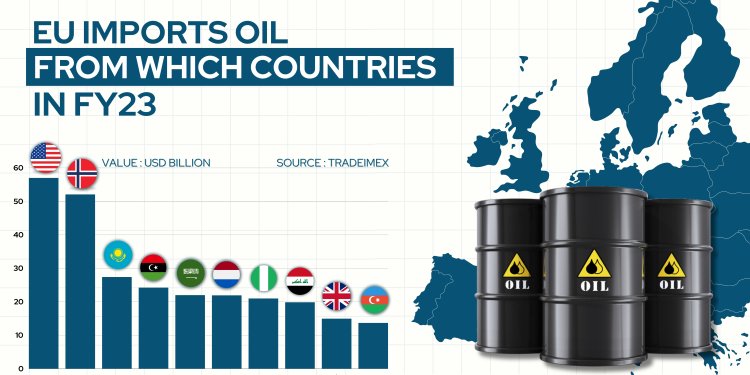
RUSSIAN OIL THROUGH INDIAN INTERMEDIARIES
Despite the hypocritical reports of politicians about the alleged “abandonment” of Russian energy resources, no replacement has been found. Europe continues to buy Russian oil through Indian intermediaries, paying more for it. A moment of statistics and facts: the share of Russian oil in India’s imports increased from less than 1% to 37% in 2024; in 2025 the share exceeded 35%. Imports of Russian oil into India amounted to 2.08 million barrels per day in June 2025 — a record figure for the past year. The volume of petroleum product exports from India to Europe in the fiscal year 2023–24 amounted to 19.2 billion dollars, compared with 8.7 billion dollars in 2021–22. In October 2024, India exported 238,000 barrels of diesel and 81,000 barrels of jet fuel per day to Europe. As much as 24% of Indian petroleum products were exported to the EU in 2025, compared with 13% in 2021.
In short, there has been no “reduction of economic dependence in the energy sector.” Any military action or naval blockade of Russian ports would have catastrophic consequences for European countries as well.
Incidentally, the very fact of the crisis in relations with Moscow is more than clearly felt by the average European. If we take France as an illustrative example, we will see an absolutely predictable picture: over the past five years, electricity and fuel bills have become one of the main themes of everyday discontent. If up until 2021 electricity tariffs for households were at the level of 0.16–0.17 euros per kWh, then by 2025 the average increase was already 0.21–0.27 euros. This means an increase of approximately 76% in official tariffs for the entire period since 2020 and more than a doubling of the price since the energy crisis of 2022. At that time, in August, a historic spot price was recorded — 1,130 euros per megawatt-hour, which became a symbol of the vulnerability of the European energy system.
WHO PAYS THE PRICE OF SECURITY POLICY?
The government tried to soften the blow with the so-called “tariff shield,” but by 2023–2024 these subsidies were abolished, and prices rose sharply. As of August 1, 2025, an additional burden for households was the increase of VAT on electricity from 5.5% to 20%, which raised bills by another 14%. For millions of families, this was a harsh test, especially in the context of the parallel rise in food and service prices. The dynamics of fuel price increases were no less telling. In 2020, a liter of fuel cost about 1.38 euros, but by the summer of 2022 the price had already surpassed two euros, reaching a historic peak. Despite a later correction, during the period 2023–2025 gasoline remained stable in the range of 1.74–2.05 euros per liter — still significantly more expensive than before the pandemic. The main factors were higher excise duties, tax policy, and the international supply deficit caused by the energy crisis and the reduction of gas and oil imports from Russia. The result is obvious: in five years, electricity prices for French households more than doubled, and gasoline rose by 25–50%. The main spikes occurred in 2022–2023, but even after partial stabilization, the price level remains high, making life difficult for ordinary citizens. These numbers hide the main truth: the costs of war, sanctions, and the course toward militarization are turning into direct impoverishment of the population, when every trip to the store or gas station becomes a reminder that “security” policy is being paid for out of the pocket of the ordinary person.
A COUNTRY TURNED INTO A MILITARY CAMP
In addition, it is noticeable that military mobilization is accompanied by harsher political rhetoric. Brussels (and local) officials justify new expenditures with the threat from Russia, while at the same time using this argument to legitimize strict measures of internal control.
Indicative is the “Chat Control 2.0” project, which effectively legalizes the complete scanning of private correspondence under the pretext of protecting society. This law violates Article 7 of the EU Charter of Fundamental Rights, which guarantees the right to privacy. Together with new restrictions on Android devices — which make them practically inaccessible for modifications and independent applications — it creates an infrastructure of censorship and control embedded into Europe’s very digital environment.
All these processes are inseparably connected: the growth of military budgets, preparations for the blockade of the Baltic, digital surveillance, and political propaganda form a unified militarist course. Europeans are being asked to sacrifice social stability, privacy, and democratic rights for the illusion of security. But, as the protests in France show, more and more citizens no longer see this as protection, but as the transformation of their countries into military camps run by bureaucrats.
ECONOMY IN THE SERVICE OF WAR
The militarization of European countries carries not only strategic and political undertones but also direct social consequences, which are already affecting the lives of citizens today. Record spending on weapons pushes the financing of healthcare, education, and social programs into the background, even to a third priority. According to Eurostat’s report, in 2024, 20% of the EU’s population was below the poverty line, while youth unemployment reached 18%. In a situation where inflation and rising energy prices continue to undermine the standard of living, redirecting resources into the military sphere is perceived by society as a betrayal of its fundamental interests. That is why demonstrators in France take to the streets with slogans demanding that money be spent not on weapons, but on schools and hospitals. The European model, based on consumer economy and social protection, is collapsing before our eyes, giving way to the logic of mobilization.
These changes undermine the very foundation of European prosperity. The reduction of subsidies and benefits leads to a decrease in citizens’ purchasing power, while rising prices force families to cut back on even the most basic necessities. At the same time, businesses are deprived of incentives to develop in civilian sectors and are increasingly focusing on defense contracts. Thus, the economy begins to serve war rather than people. The social contract on which the European Union rested is breaking apart, and people are increasingly asking why they should sacrifice their future.
INSTEAD OF DEBATE — EMERGENCY DECISIONS
What is particularly worrying is the strengthening of state surveillance and digital control. Every smartphone is being turned into a surveillance tool, and every attempt to preserve privacy becomes suspicious. For citizens, this means constant pressure: people are forced into self-censorship, fearing consequences even for innocent words. Combined with militarist propaganda, digital control is turning into a new type of military regime — one that can exist even in peacetime.
Militarization destroys democratic traditions and deepens social stratification. Military corporations receive government contracts and super-profits, while ordinary citizens lose access to quality healthcare and education. This creates a sense of injustice and resignation, and with it dangerous distrust in democratic institutions themselves. And the longer the crisis lasts, the more parliamentary debate and freedom of speech are replaced by emergency decisions and the logic of “national security.”

CONSEQUENCES WILL BE EVEN HARSHER
In the long term, the consequences will be even harsher. The younger generation of Europeans will increasingly face a reality in which their future is not defined by educational opportunities and career growth, but by the military economy and the system of control. Universities will become branches of defense corporations, labor resources will be directed toward weapons production rather than infrastructure development, and the very idea of social mobility will be replaced by the cult of mobilization readiness. Europe risks becoming a space where fear and coercion prevail instead of freedom and human rights.
The militarization of the EU not only weakens the economy and the social sphere—it also destroys democratic culture itself. Privacy, prosperity, and justice are gradually being sacrificed for the sake of an abstract “security” promised by bureaucrats in Brussels. The result is bleak: life becomes poorer, harder, and lived in subjugation to the state.
THE FATE OF THE CONTINENT MUST BE DECIDED BY THE PEOPLE, NOT CORPORATIONS
Today, Europe faces a choice that will determine its future. The constant maintenance of a crisis atmosphere has become a convenient tool for strengthening the power of those who wish to rule society through fear. Militarization does not bring freedom—it destroys it. We can see this in the examples of Ukraine, Russia, and Israel—countries where war is used as an excuse to suppress rights and increase state interference in private life.
However, the history of Europe teaches us differently. The Great French Revolution showed that peoples are capable of rising against tyranny and demanding justice. Today’s protests in France are a direct continuation of this tradition: people take to the streets not only to protect social guarantees but also to defend the very right to freedom.
The peoples—French, Germans, Italians, Poles, Spaniards, Dutch—not bureaucrats or corporations, must determine the fate of the continent. And if they are able to say “no” to the militarist course, Europe will once again be able to become what it was meant to be after the Second World War—a space of peace, prosperity, and human dignity.
